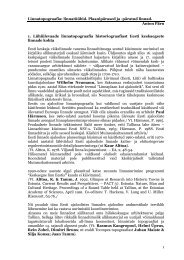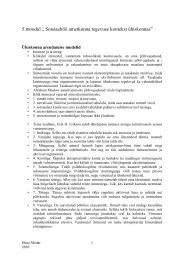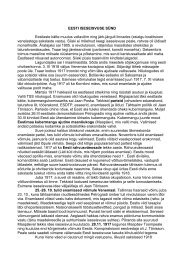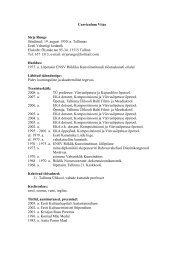Hostage Negotiation Consultant: Emerging Role for the Clinical ...
Hostage Negotiation Consultant: Emerging Role for the Clinical ...
Hostage Negotiation Consultant: Emerging Role for the Clinical ...
You also want an ePaper? Increase the reach of your titles
YUMPU automatically turns print PDFs into web optimized ePapers that Google loves.
Professional Psychology: Research and Practice<br />
1988, Vol. 19, No. 2, 175-179<br />
<strong>Hostage</strong> <strong>Negotiation</strong> <strong>Consultant</strong>: <strong>Emerging</strong> <strong>Role</strong><br />
<strong>for</strong> <strong>the</strong> <strong>Clinical</strong> Psychologist<br />
G. Dwayne Fuselier<br />
Special Operations and Research Unit<br />
FBI Academy<br />
Quantico, Virginia<br />
Police departments across <strong>the</strong> nation are requesting <strong>the</strong> consultation of psychologists during<br />
hostage incidents. There is a growing body of literature on <strong>the</strong> psychological aspects of hostage<br />
situations and negotiation. I review <strong>the</strong> existing body of literature with respect to who takes<br />
hostages and why, selection of negotiators, <strong>the</strong> role of <strong>the</strong> clinical psychologist as a consultant,<br />
victims' responses to being held hostage and <strong>the</strong>oretical explanations <strong>for</strong> <strong>the</strong> Stockholm Syndrome,<br />
and psychological sequelae and treatment suggestions after release.<br />
<strong>Hostage</strong> negotiation is now a firmly established concept in<br />
virtually all law en<strong>for</strong>cement agencies in <strong>the</strong> United States.<br />
Some large police departments have <strong>the</strong>ir own training<br />
courses, and <strong>the</strong> smaller ones receive training from <strong>the</strong> large<br />
agencies, <strong>the</strong> state police, or <strong>the</strong> FBI (Federal Bureau of<br />
Investigation). These training courses often recommend consultation<br />
with a clinical psychologist during a hostage situation,<br />
particularly if circumstances indicate that <strong>the</strong> hostage<br />
taker is mentally disturbed.<br />
Curiously, although law en<strong>for</strong>cement agencies recognize<br />
<strong>the</strong> potential contributions of a psychologist in hostage situations,<br />
psychologists as a group seem much less aware of <strong>the</strong><br />
growing body of literature on hostage taking and hostage<br />
negotiation. The vast majority of articles about <strong>the</strong> psychological<br />
factors involved in hostage negotiation have been<br />
published in law en<strong>for</strong>cement journals; very few articles appear<br />
in psychiatric journals. Those articles in psychiatric<br />
journals usually focus on <strong>the</strong> victim's response after <strong>the</strong><br />
incident and on treatment ra<strong>the</strong>r than on <strong>the</strong> negotiation<br />
process itself. If psychologists are going to participate in <strong>the</strong><br />
negotiation process in addition to providing postincident<br />
treatment to victims, <strong>the</strong>n it would be prudent <strong>for</strong> those<br />
psychologists to familiarize <strong>the</strong>mselves with <strong>the</strong> body of<br />
knowledge in that area.<br />
Because this relatively new role <strong>for</strong> psychologists has received<br />
so little attention in psychological literature, I highlight<br />
major aspects of hostage negotiation, including <strong>the</strong> types of<br />
hostage takers and <strong>the</strong>ir motivation <strong>for</strong> taking hostages, selection<br />
of negotiators, <strong>the</strong> role of <strong>the</strong> psychological consultant,<br />
victims' responses to being held hostage and <strong>the</strong>oretical expla-<br />
G. DWAYNE FUSELIER received his PhD from Louisiana State University<br />
in 1973. He is currently a supervisory special agent in <strong>the</strong><br />
Special Operations and Research Unit, FBI (Federal Bureau of Investigation)<br />
Academy, Quantico, Virginia. As a faculty member at <strong>the</strong><br />
FBI Academy, he provides training to FBI agents and police officers<br />
in hostage negotiation and lectures to FBI National Academy students<br />
on <strong>the</strong> behavioral component of crisis management.<br />
CORRESPONDENCE CONCERNING THIS ARTICLE should be addressed to<br />
G. Dwayne Fuselier, Special Operations and Research Unit, FBI<br />
Academy, Quantico, Virginia 22315.<br />
175<br />
In <strong>the</strong> public domain<br />
nations <strong>for</strong> <strong>the</strong> Stockholm Syndrome (to be described), and<br />
psychological sequelae and treatment suggestions after release.<br />
Who Takes <strong>Hostage</strong>s?<br />
Most articles list three (Goldaber, 1979;Pearce, 1977;Stratton,<br />
1978) or four (Fuselier, 1981a; Hassel, 1975; Maher,<br />
1977) basic types of hostage taker: (a) <strong>the</strong> political activist or<br />
terrorist, (b) <strong>the</strong> criminal, (c) <strong>the</strong> mentally disturbed person,<br />
and (d) <strong>the</strong> prisoner.<br />
Stratton (1978) identified <strong>the</strong> political terrorist as <strong>the</strong> most<br />
difficult to negotiate with because of this type's "total commitment,<br />
exhaustive planning, and ability to exert power<br />
effectively" (p. 7). Political terrorists take hostages to obtain<br />
as much publicity as possible <strong>for</strong> <strong>the</strong>ir cause, and <strong>the</strong>ir demands<br />
often go beyond <strong>the</strong> authority of <strong>the</strong> local police<br />
department, requiring <strong>the</strong> involvement of federal officials.<br />
Hassel (1975) asserted that <strong>the</strong> hostage situation most frequently<br />
faced by law en<strong>for</strong>cement officers in <strong>the</strong> United States<br />
is that of a criminal trapped while committing a crime. He<br />
believed that a trapped, armed robber poses <strong>the</strong> worst initial<br />
threat to both hostages and <strong>the</strong> police.<br />
According to Supervisory Special Agent Thomas Strentz, a<br />
faculty member at <strong>the</strong> FBI Academy, approximately 52% of<br />
all hostage incidents involve mentally disturbed people<br />
(Strentz, 1985). (Note <strong>the</strong> apparent change in "most frequently<br />
occurring" type of hostage taker from criminal [Hassel,<br />
1975] to mentally disturbed [Strentz, 1985].) The term<br />
mentally disturbed includes any diagnosable mental disorder,<br />
but <strong>the</strong> hostage taker usually falls into one of <strong>the</strong> following<br />
categories: (a) paranoid, various types, (b) depressed, various<br />
types, (c) antisocial personality, or (d) inadequate personality<br />
(Fuselier, 1981a). Maher (1977) considered <strong>the</strong> mentally disturbed<br />
hostage taker <strong>the</strong> hardest to handle. Interestingly, three<br />
authors (Hassel, 1975; Maher, 1977; Stratton, 1978) described<br />
different types of hostage takers (trapped criminal, mentally<br />
disturbed, and terrorist, respectively) as being <strong>the</strong> most difficult<br />
to deal with or as posing <strong>the</strong> greatest threat. These<br />
contradictory descriptions reflect a significant problem <strong>for</strong><br />
both practitioners and authors writing about this topic: There<br />
appears to be no systematic nationwide collection or compi-
176 G. DWAYNE FUSELIER<br />
lation (much less review or analysis) of in<strong>for</strong>mation on hostage<br />
incidents by any law en<strong>for</strong>cement agency in <strong>the</strong> United States.<br />
Thus conclusions are drawn and generalizations are made on<br />
<strong>the</strong> basis of incidents from one particular city or from those<br />
incidents with which an author is personally familiar.<br />
Two authors (Hassel, 1975; Fuselier, 1981a) also listed<br />
prisoners as a distinct fourth category of hostage taker.<br />
Why Do People Take <strong>Hostage</strong>s?<br />
Political terrorists take hostages <strong>for</strong> four basic reasons: (a)<br />
to show <strong>the</strong> public that <strong>the</strong> government cannot protect its<br />
own citizens; (b) to virtually guarantee immediate coverage<br />
and publicity <strong>for</strong> <strong>the</strong>ir cause; (c) to support <strong>the</strong>ir hope that<br />
after repeated incidents <strong>the</strong> government will overreact and<br />
place excessive restrictions on its citizens, thus causing civil<br />
discontent; and (d) often to demand <strong>the</strong> release of members<br />
of <strong>the</strong>ir group who have been incarcerated.<br />
If a hostage is taken in a criminal situation, it is usually<br />
because of <strong>the</strong> criminal's inability to complete <strong>the</strong> crime and<br />
escape be<strong>for</strong>e <strong>the</strong> police arrive. In this case, <strong>the</strong> criminal takes<br />
hostages spontaneously to ensure his or her own safety. There<strong>for</strong>e,<br />
he or she invariably demands safe passage, a means of<br />
escape, and often additional money.<br />
Mentally disturbed people, of course, may take hostages <strong>for</strong><br />
a variety of reasons. The person may be responding to hallucinations<br />
or delusional beliefs. He or she may be trying to<br />
prove to someone that he or she is not inadequate and<br />
powerless, or he or she may feel that life is not worth living<br />
and <strong>the</strong> best that he or she can do <strong>for</strong> his or her family is to<br />
remove <strong>the</strong>m from this "terrible" life (Fuselier, 198la).<br />
Prisoners usually take hostages to protest conditions within<br />
<strong>the</strong> prison system, and most often <strong>the</strong> hostages are prison<br />
employees. These hostages give <strong>the</strong>m bargaining power and a<br />
significant amount of media exposure. Needham (1977), in<br />
summarizing a 48-item questionnaire sent to <strong>the</strong> 50 largest<br />
cities in <strong>the</strong> United States and to <strong>the</strong> Departments of Correction<br />
in all 50 states (with a 52% return rate), concluded that<br />
<strong>the</strong>re was a high degree of concurrence between negotiation<br />
tactics in prison situations and those considered standard in<br />
o<strong>the</strong>r law en<strong>for</strong>cement negotiation situations. Fur<strong>the</strong>rmore,<br />
<strong>the</strong> report of <strong>the</strong> Office of <strong>the</strong> Attorney General of <strong>the</strong> State<br />
of New Mexico (1980) on <strong>the</strong> riot and hostage situation at<br />
<strong>the</strong> New Mexico State Penetentiary in February 1980 revealed<br />
that <strong>the</strong> incident was resolved by means of negotiation strategies<br />
and tactics identical to standard police negotiating tactics.<br />
My experience during <strong>the</strong> Atlanta prison siege (November<br />
23 to December 4, 1987) also confirmed that prison hostage<br />
incidents can be resolved by standard negotiation tactics, as<br />
long as one is prepared <strong>for</strong> a prolonged incident.<br />
Selection of Negotiators<br />
The abilities and skills of <strong>the</strong> negotiator obviously are quite<br />
crucial to <strong>the</strong> outcome of any hostage incident, yet we still<br />
have little in<strong>for</strong>mation on what makes a good negotiator.<br />
Only Gelbart (1979) published a study that addresses this<br />
issue. Although his dissertation title refers to success as a<br />
hostage negotiator, Gelbart really identified <strong>the</strong> personality<br />
characteristics of those selected merely <strong>for</strong> negotiation training.<br />
The subjects selected tended "to be highly adequate in<br />
social skills, communication ability, social presence, intelligence,<br />
and seem to be able manipulators" (p. 4558-B). They<br />
also scored significantly higher than rejected applicants on<br />
<strong>the</strong> Dominance (Do), Sociability (Sy), Tolerance (To), and<br />
Intellectual Efficiency (Ie) scales of <strong>the</strong> Cali<strong>for</strong>nia Psychological<br />
Inventory and were an older and more experienced group.<br />
Numerous unpublished law en<strong>for</strong>cement manuals spell out<br />
<strong>the</strong> "desirable personality traits " <strong>for</strong> negotiators, listing descriptive<br />
terms such as emotional maturity, credibility, good<br />
listening ability, good verbal ability, practical intelligence, and<br />
"ability to think clearly under stress" (Fuselier, 1981b). Although<br />
successful negotiation can be operationally defined as<br />
an incident in which no one gets injured, it is clearly understood<br />
among law en<strong>for</strong>cement negotiators that <strong>the</strong> skill of <strong>the</strong><br />
negotiator is but one variable among many that may affect<br />
<strong>the</strong> eventual outcome. There<strong>for</strong>e, in attempting to identify<br />
"successful negotiator traits" solely on <strong>the</strong> basis of <strong>the</strong> outcome<br />
of <strong>the</strong> hostage situations, one would obviously fail to<br />
take into account many o<strong>the</strong>r (often uncontrollable) variables.<br />
Clearly, this critical selection process deserves much more<br />
attention than it has received to this date.<br />
The <strong>Role</strong> of <strong>the</strong> <strong>Clinical</strong> Psychologist<br />
Although law en<strong>for</strong>cement personnel in general seem willing<br />
to use psychologists as consultants in hostage situations,<br />
psychologists working in law en<strong>for</strong>cement are divided in <strong>the</strong>ir<br />
opinions about <strong>the</strong> value of such consultants. Powitsky (1979)<br />
maintained that although psychologists may contribute significantly<br />
by per<strong>for</strong>ming certain collateral duties, such as<br />
ga<strong>the</strong>ring in<strong>for</strong>mation <strong>for</strong> negotiation strategy and serving as<br />
posttrauma counselors <strong>for</strong> hostages, "<strong>the</strong> majority of practicing<br />
psychologists, especially those who work outside of <strong>the</strong><br />
criminal justice system, would not be very helpful (and some<br />
would be harmful) in a hostage-taking situation" (p. 30).<br />
Poythress(1980) placed himself in <strong>the</strong> camp of <strong>the</strong> "guarded<br />
optimist," believing that "mental health professionals may<br />
have something to offer in <strong>the</strong> hostage situation, but probably<br />
less than <strong>the</strong> field commanders might hope <strong>for</strong>" (p. 34). He<br />
also listed three reasons why field commanders should not<br />
enlist a psychologist's opinion about <strong>the</strong> dangerousness of a<br />
situation or in <strong>the</strong> decision to use negotiation instead of<br />
tactical operations. First, most psychologists have little, if any,<br />
<strong>for</strong>mal training in <strong>the</strong>se matters because <strong>the</strong>re exists little<br />
scientific data in this area, and few psychologists have had<br />
enough field experience to develop intuitive answers or insights.<br />
Second, he stated that <strong>the</strong>ir predictions about <strong>the</strong><br />
probable dangerousness of a given person in a given situation<br />
are notoriously bad. Third, using Meehl (1954) as a source,<br />
Poythress indicated that using statistical (actuarial) methods<br />
ra<strong>the</strong>r than clinical judgment greatly increases <strong>the</strong> accuracy<br />
of such predictions. Although he thought that it would be<br />
better <strong>for</strong> field commanders to make major decisions without<br />
<strong>the</strong> opinions of psychologists, Poythress did offer an actuarial<br />
chart to aid in predicting violence.<br />
Wardlaw (1984), though sharing Poythress's (1980) concern<br />
about using <strong>the</strong> psychologist to predict dangerousness of a<br />
hostage situation, indicated that <strong>the</strong> psychologist can contribute<br />
to <strong>the</strong> negotiation process by suggesting ways of handling
particular interactions with <strong>the</strong> hostage taker and, more importantly,<br />
by monitoring <strong>the</strong> behavior of o<strong>the</strong>r team members<br />
and assessing <strong>the</strong>ir reactions to <strong>the</strong> stressful situation.<br />
On <strong>the</strong> more optimistic side, Stratton (1977) believed that<br />
<strong>the</strong> psychologist can be of benefit and that when <strong>the</strong> field<br />
commander consults with <strong>the</strong> psychologist, "<strong>the</strong> chances are<br />
better that a particular situation will resolve itself successfully<br />
without injury to anyone" (p. 74). Reiser (1982) also believed<br />
that a psychologist can contribute as a backup and adviser to<br />
<strong>the</strong> negotiation team. He asserted that <strong>the</strong>y can provide<br />
training in <strong>the</strong> areas of (a) assessing <strong>the</strong> motives and personality<br />
of <strong>the</strong> hostage taker, (b) interviewing and communication<br />
skills, (c) dealing with stress and fatigue, and (d) understanding<br />
of <strong>the</strong> Stockholm Syndrome.<br />
I (Fuselier, 1981b) recommended that psychological consultants<br />
be used, but only after <strong>the</strong>y receive training in hostage<br />
negotiation concepts. "A typical, well-trained clinical psychologist<br />
with no specific training in hostage negotiation will<br />
only be of slight assistance" (p. 15), but if that psychologist is<br />
"exposed to in<strong>for</strong>mation available about hostages, hostage<br />
taking, and negotiation procedures, <strong>the</strong>n [<strong>the</strong> police] will have<br />
a very valuable addition to [<strong>the</strong>ir] hostage negotiation team"<br />
(p. 15). After such additional training, including attendance<br />
at a hostage negotiation seminar, <strong>the</strong> psychologist can assist<br />
in both determining whe<strong>the</strong>r a mental disorder exists and<br />
deciding on a particular negotiation approach, regardless of<br />
whe<strong>the</strong>r mental disorder does exist. Fur<strong>the</strong>rmore, even with<br />
additional training, <strong>the</strong> psychologist should be used as a<br />
negotiation consultant and not as <strong>the</strong> primary negotiator.<br />
This would allow <strong>the</strong> psychologist to maintain a more objective<br />
role in assessing <strong>the</strong> mental status and per<strong>for</strong>mance of<br />
<strong>the</strong> negotiator.<br />
Because it was evident that <strong>the</strong>re was not a consensus of<br />
opinion among psychologists and o<strong>the</strong>r mental health professionals<br />
as to an appropriate role (if any) during <strong>the</strong> negotiation<br />
process, I conducted a survey to determine whe<strong>the</strong>r <strong>the</strong>re was<br />
a consensus among police departments on <strong>the</strong> use of psychologists<br />
(or o<strong>the</strong>r mental health professionals) as consultants<br />
during <strong>the</strong> negotiations process.<br />
Thirty-four municipal police departments (ranging in size<br />
from 26 to 12,000 officers) completed a questionnaire covering<br />
a variety of topics related to hostage negotiation. The<br />
answers were provided by <strong>the</strong> negotiation team leader or a<br />
command-level officer if <strong>the</strong>re was no negotiation team. On<br />
that questionnaire, five questions were related to <strong>the</strong> use of a<br />
mental health consultant. Those questions and responses were<br />
as follows:<br />
Question 1: Does your department have designated negotiators?<br />
Of 34 participants, 31 (91%) responded yes. Fur<strong>the</strong>rmore,<br />
as department size increased, that percentage quickly<br />
reached 100%: Of 24 departments with more than 151 officers,<br />
24(100%) said yes; of 10 departments with 151 or fewer,<br />
7 (70%) said yes.<br />
Question 2: Does your department use a mental health<br />
consultant to <strong>the</strong> negotiation team? Of <strong>the</strong> 31 departments<br />
with a negotiation team, 18 (58%) said yes. Again, as department<br />
size increased, <strong>the</strong> percentage of departments responding<br />
yes also increased: Of 19 departments with more than 427<br />
officers, 15 (79%) said yes; of 12 departments with 427 or<br />
HOSTAGE NEGOTIATION CONSULTANT 177<br />
fewer, 3 (25%) said yes. The two largest departments stated,<br />
"We used to use one but no longer do because our team has<br />
acquired sufficient experience."<br />
Question 3: How is <strong>the</strong> consultant used in negotiation<br />
incidents? (More than one response was allowed.) Of <strong>the</strong> 18<br />
departments, 13 (72%) used <strong>the</strong>irs <strong>for</strong> assessment of subject,<br />
10 (56%) <strong>for</strong> postincident counseling <strong>for</strong> police, 7 (39%) <strong>for</strong><br />
postincident critique, 5 (28%) <strong>for</strong> negotiation techniques, 5<br />
(28%) as a liaison with o<strong>the</strong>r mental health professionals, 3<br />
(17%) <strong>for</strong> interviewing <strong>the</strong> subject's family, 2 (11 %) <strong>for</strong> postincident<br />
counseling <strong>for</strong> victims, 1 (6%) <strong>for</strong> "o<strong>the</strong>r" (e.g.,<br />
assistance in training), and none as primary negotiator.<br />
Question 4: Is your consultant trained in hostage negotiation<br />
techniques? Of 18 departments, 8 (44%) said yes, 8 (44%)<br />
said no, and 2(11%) did not know.<br />
Question 5: Is <strong>the</strong> mental health professional considered a<br />
consultant to, or a member of, <strong>the</strong> hostage negotiation team?<br />
Of 18 departments, 15 (83%) considered <strong>the</strong> mental health<br />
professional a consultant, whereas 3 (17%) considered that<br />
person a member of <strong>the</strong> team.<br />
Even from this relatively small sample, some generalizations<br />
are possible. First, even small municipal police departments<br />
are likely to have designated negotiators, and, as <strong>the</strong><br />
size of <strong>the</strong> department increases, <strong>the</strong> presence of a negotiation<br />
team becomes a virtual certainty. Second, although overall<br />
only 58% of departments report using a consultant, this<br />
percentage will increase as department size increases. However,<br />
<strong>the</strong> percentage may again decrease among <strong>the</strong> very<br />
largest departments. Third, <strong>the</strong> consultants are being used<br />
most often in a manner consistent with <strong>the</strong>ir clinical training—that<br />
is, assessment of <strong>the</strong> mental status of <strong>the</strong> subject.<br />
Fourth, only slightly less than half of <strong>the</strong> consultants have<br />
received training in hostage negotiation techniques, which<br />
may be one factor accounting <strong>for</strong> why only 28% (5 of 18)<br />
were used to provide input on negotiation tactics. Last, <strong>the</strong><br />
great majority (83%) are considered consultants to, ra<strong>the</strong>r<br />
than members of, <strong>the</strong> negotiation team. This may be a reflection<br />
of <strong>the</strong> "sworn officer" versus "civilian" dichotomy often<br />
present in law en<strong>for</strong>cement agencies.<br />
Victim Response and <strong>the</strong> Stockholm Syndrome<br />
The behavioral responses of victims must be considered in<br />
two separate but related phases. The first set of behaviors<br />
occurs while <strong>the</strong> person is being held hostage, <strong>the</strong> second after<br />
being released. Although each individual's reaction to being<br />
taken hostage is unique, a common set of behaviors, called<br />
<strong>the</strong> Stockholm Syndrome, is likely to occur. The name <strong>for</strong><br />
<strong>the</strong> syndrome comes from a 1973 hostage incident in Stockholm,<br />
Sweden, in which four bank employees were held <strong>for</strong> 5<br />
days in a bank vault. Surprisingly, <strong>the</strong> hostages reported<br />
fearing <strong>the</strong> police more than <strong>the</strong>ir captors during <strong>the</strong> ordeal,<br />
and afterwards <strong>the</strong>y felt puzzled because <strong>the</strong>y had no ill<br />
feelings toward <strong>the</strong>ir captors (Ochberg, I980b; Strentz, 1979).<br />
This phenomenon occurs quite frequently in hostage incidents<br />
and does not seem to be related to <strong>the</strong> age, sex, or nationality<br />
of ei<strong>the</strong>r <strong>the</strong> hostages or <strong>the</strong> captors. The syndrome appears<br />
to consist of three conditions that may be present individually<br />
or in combination (Ochberg, 1980b): (a) negative feelings on
178 G. DWAYNE FUSELIER<br />
<strong>the</strong> part of <strong>the</strong> hostage toward authorities, (b) positive feelings<br />
on <strong>the</strong> part of <strong>the</strong> hostage toward <strong>the</strong> hostage taker, and (c)<br />
positive feelings reciprocated by <strong>the</strong> hostage taker toward <strong>the</strong><br />
hostage.<br />
Strentz (1979) indicated that development of <strong>the</strong> syndrome<br />
depends on <strong>the</strong> interaction of three factors: <strong>the</strong> passage of<br />
time, whe<strong>the</strong>r hostages are isolated, and whe<strong>the</strong>r contact<br />
between <strong>the</strong> hostage taker and <strong>the</strong> hostage is positive or<br />
negative. In general, if <strong>the</strong> hostage takers keep in frequent<br />
contact with <strong>the</strong> hostages (e.g., all in <strong>the</strong> same room) and if<br />
that contact is positive (or, really, not negative; e.g., no<br />
beatings, rape, or verbal abuse), <strong>the</strong>n <strong>the</strong> passage of time (even<br />
a few hours) will promote development of <strong>the</strong> syndrome.<br />
Conversely, if <strong>the</strong> hostage taker abuses <strong>the</strong> hostages or isolates<br />
<strong>the</strong>m—<strong>for</strong> example, by placing <strong>the</strong>m in a separate room or<br />
by making <strong>the</strong>m wear hoods—<strong>the</strong> passage of time will not<br />
significantly aid in development of <strong>the</strong> syndrome.<br />
Police negotiators are trained to promote <strong>the</strong> development<br />
of <strong>the</strong> Stockholm Syndrome, even though hostages may become<br />
sympa<strong>the</strong>tic with <strong>the</strong> hostage taker and antagonistic<br />
toward <strong>the</strong> police, because any reciprocation of positive (sympa<strong>the</strong>tic)<br />
feelings by <strong>the</strong>ir captor obviously increases <strong>the</strong> hostages'<br />
chances of survival. This was dramatically illustrated in<br />
<strong>the</strong> case history provided by Ochberg (1978). He interviewed<br />
Gerard Vaders, a victim of <strong>the</strong> 1975 South Moluccan train<br />
hijacking in Holland. Mr. Vaders stated that he had been<br />
chosen as <strong>the</strong> third person to be executed if <strong>the</strong> police did not<br />
meet <strong>the</strong> latest deadline. Through <strong>the</strong> night one of <strong>the</strong> hostage<br />
takers repeatedly stated, "Your time has come. Say your<br />
prayers." In <strong>the</strong> morning, when he was to die, he asked to<br />
give ano<strong>the</strong>r hostage a message to his family. As <strong>the</strong> terrorists<br />
listened, he explained to this fellow hostage his family situation,<br />
giving advice to his wife about working out difficulties<br />
with a foster child, recounting a recently resolved marital<br />
crisis, and stating his feeling that he had failed as a human<br />
being. When Mr. Vaders finished and stated his readiness to<br />
die, <strong>the</strong> terrorists said, "No, someone else goes first."<br />
The Stockholm Syndrome has numerous implications <strong>for</strong><br />
<strong>the</strong> negotiation process (Ochberg, 1980a). First, in any rescue<br />
attempt, a hostage cannot be trusted to cooperate and assist<br />
<strong>the</strong> rescuers. Strentz (1979) reported some <strong>for</strong>mer hostages'<br />
saying that if a hostage taker who had treated <strong>the</strong>m fairly had<br />
said, "Stand up," when assaulting police officers yelled "Lie<br />
down," <strong>the</strong>y would have stood up. Second, released hostages<br />
cannot be relied upon to give accurate in<strong>for</strong>mation about<br />
conditions inside <strong>the</strong> siege area. Third, hostages may be<br />
unwilling to testify against <strong>the</strong>ir captors and may even join<br />
<strong>the</strong> hostage takers in speaking out against authority figures.<br />
The final and perhaps most important implication is that<br />
hostages and <strong>the</strong>ir captors may develop mutually positive<br />
feelings that promote <strong>the</strong> survival of all concerned.<br />
Theoretical Explanations<br />
In ef<strong>for</strong>ts to explain <strong>the</strong> Stockholm Syndrome, authors<br />
frequently recognize <strong>the</strong> use of <strong>the</strong> defense mechanisms of<br />
denial and regression, but <strong>the</strong>y also attempt to provide a more<br />
comprehensive <strong>the</strong>oretical framework. Strentz (1979) discussed<br />
<strong>the</strong> phenomenon of identification with <strong>the</strong> aggressor<br />
but did not see it as an adequate explanation. Ra<strong>the</strong>r, he<br />
viewed <strong>the</strong> syndrome as "regression to a more elementary<br />
level of development.... The hostage is more like <strong>the</strong> infant<br />
who must cry <strong>for</strong> food, cannot speak, and may be bound.<br />
Like <strong>the</strong> infant, <strong>the</strong> hostage is in a state of extreme dependence<br />
and fright" (p. 4). Ochberg (1980a) adopted a similar position,<br />
stating, "Captivity makes one so infantile and so frightened<br />
that <strong>the</strong> individual recovers a certain primitive, unconscious,<br />
positive feeling. This can be traced to <strong>the</strong> way <strong>the</strong> infant feels<br />
trust, pleasure, and something like gratitude toward <strong>the</strong> parent<br />
who removes <strong>the</strong> terror of infancy" (p. 74). He fur<strong>the</strong>r believed<br />
that adults who experience this feeling in captivity do not<br />
understand it as infantile affection; ra<strong>the</strong>r, <strong>the</strong>y translate <strong>the</strong><br />
feeling into emotions more appropriate <strong>for</strong> <strong>the</strong>ir age and<br />
gender.<br />
Symonds (1983) also stressed infantilism:<br />
An individual beset by basic anxiety responds with primitive<br />
adaptive behavior. Adaptive responses learned in maturity evaporate,<br />
to be replaced with infantile survival mechanisms. I call<br />
this response in victims traumatic psychological infantilism. It<br />
compels an individual to cling to <strong>the</strong> very person who is endangering<br />
his life. At this point, victims become placid and compliant.<br />
If <strong>the</strong> atmosphere of terror persists, <strong>the</strong> psychologically<br />
traumatized victim perceives that <strong>the</strong> terrorist, who wields <strong>the</strong><br />
power of life and death, has chosen to let <strong>the</strong> victim live. Then<br />
a very profound behavioral and attitudinal reaction occurs within<br />
<strong>the</strong> victim: Now he sees <strong>the</strong> terrorist as a "good guy." This<br />
phenomenon is called pathological transference, (p. 75)<br />
Some generalizations, <strong>the</strong>n, about <strong>the</strong> behavior of hostages<br />
while being held can be made, and some <strong>the</strong>oretical explanations<br />
are available. Supervisory Special Agent Frederick J.<br />
Lanceley, a faculty member at <strong>the</strong> FBI Academy, quotes<br />
Machiavelli (1513/1947) as follows: "Men, when <strong>the</strong>y receive<br />
good from whence <strong>the</strong>y expect evil, feel <strong>the</strong> more indebted to<br />
<strong>the</strong>ir benefactor" (p. 28). Although not offered as a <strong>the</strong>oretical<br />
explanation of <strong>the</strong> syndrome, this quotation seems to address<br />
<strong>the</strong> heart of <strong>the</strong> matter. This feeling of "indebtedness" was<br />
dramatically illustrated by <strong>the</strong> statement of one of <strong>the</strong> flight<br />
attendants on Trans World Airlines (TWA) Flight 355, hijacked<br />
by Croatian nationalists in September 1976. Immediately<br />
after <strong>the</strong> nonviolent resolution of <strong>the</strong> incident, this flight<br />
attendant said to <strong>the</strong> leader of <strong>the</strong> terrorists, "Thank you <strong>for</strong><br />
giving me back my life."<br />
Psychological Sequelae and Treatment Suggestions<br />
The behaviors and reactions of hostages after <strong>the</strong>ir release<br />
have, to a greater extent, been addressed in <strong>the</strong> psychiatric<br />
and psychological literature. These articles, <strong>for</strong> <strong>the</strong> most part,<br />
focus on identifying <strong>the</strong> psychological sequelae to being held<br />
hostage (Fenyvesi, 1977, 1980; Hillman, 1981; Ochberg,<br />
1980a) or on offering treatment suggestions (Symonds, 1979;<br />
Wolk, 1981). Although Ochberg (1980a) first noted that<br />
"There is no compelling syn<strong>the</strong>sis of recent hostage events<br />
organized as a guide <strong>for</strong> <strong>the</strong> clinician" (p. 73), he did describe<br />
four basic response patterns as follows: One group responds<br />
quite well, stating that <strong>the</strong> crisis "provides an opportunity <strong>for</strong><br />
mastery, reassessment of values, renegotiating of critical relationships<br />
with o<strong>the</strong>rs and a feeling of a new lease on life"<br />
(p. 74). A second group seems generally unaffected by <strong>the</strong><br />
incident. Dutch survivors of <strong>the</strong> second Moluccan train hijacking<br />
in Holland in 1977 were rural people with a stoic<br />
outlook and were "as nonpsychologically-minded as people
could be" (p. 74). Wilhelm Van Dijk examined <strong>the</strong>se people<br />
and found <strong>the</strong>m remarkably untouched by <strong>the</strong> incident. The<br />
last two groups are (a) those who are affected by <strong>the</strong> incident<br />
and suffer psychological symptoms but avoid seeking help<br />
and (b) those who suffer and do seek help (Ochberg, 1980a).<br />
Ochberg fur<strong>the</strong>r stated that one third to one half of <strong>the</strong><br />
hostages he had seen belonged to <strong>the</strong> latter two groups. He<br />
noted a variety of psychological symptoms, ranging from<br />
anxiety in <strong>the</strong> <strong>for</strong>m of nightmares, startle reactions, and<br />
phobias to self-medication with drugs and alcohol, psychophysiological<br />
reactions, delayed-onset depression (particularly<br />
after <strong>the</strong> "celebrity" status has ended), and paranoid reactions,<br />
obsessions, and various idiosyncratic adjustment difficulties.<br />
Symonds (1979) described a treatment approach <strong>for</strong> hostage<br />
victims used at New York's Karen Horney Victim Treatment<br />
Center. Developed from work with <strong>the</strong> victims of concentration<br />
camps, <strong>the</strong> treatment begins with continual reassurance<br />
to hostages that <strong>the</strong>ir behavior during captivity is fully acceptable.<br />
The treatment <strong>the</strong>n focuses on (a) <strong>the</strong> early restoration<br />
of power to <strong>the</strong> victim, (b) reduction of <strong>the</strong> feeling of<br />
isolation through nurturance, (c) diminishing <strong>the</strong> feelings of<br />
helplessness by encouraging participation in planning <strong>for</strong> <strong>the</strong><br />
future, and (d) encouraging feelings of control to reduce <strong>the</strong><br />
stress of being subjected to someone's domineering behavior.<br />
Wolk (1981) described a two-pronged approach used in<br />
working with correctional facility employees who had been<br />
held hostage. This method centered on environmental manipulation<br />
in <strong>the</strong> <strong>for</strong>m of transfer to a less violent facility or<br />
reassignment to a less stressful work area in conjunction with<br />
individual and group psycho<strong>the</strong>rapy that stresses expression<br />
of anger at <strong>the</strong>ir <strong>for</strong>mer captors and recognition and acceptance<br />
of <strong>the</strong>ir vulnerability.<br />
The acceptance of (and perhaps demand <strong>for</strong>) negotiation<br />
as a response of first choice in hostage situations has thrust<br />
law en<strong>for</strong>cement officers into <strong>the</strong> field of crisis intervention.<br />
They are often expected to deal with potentially violent individuals<br />
who are in <strong>the</strong> midst of a psychological and emotional<br />
crisis. As indicated by <strong>the</strong> differing (and sometimes contradictory)<br />
descriptions and explanations of various components of<br />
<strong>the</strong> hostage negotiation process, this relatively new field of<br />
law en<strong>for</strong>cement is still evolving. Police departments are still<br />
working on basic negotiation strategies (i.e., behavioral<br />
change) and attempting to assess <strong>the</strong> likelihood that a person<br />
will carry out his or her threats of violence. "Successful"<br />
negotiator characteristics are still postulated on face validity<br />
alone. Apparently, even <strong>the</strong> issue of whe<strong>the</strong>r a psychologist<br />
has anything unique to offer in <strong>the</strong> negotiation scenario is<br />
still open <strong>for</strong> debate. We still have only <strong>the</strong> most rudimentary<br />
understanding of <strong>the</strong> development of <strong>the</strong> Stockholm Syndrome<br />
and its effect on hostages during an incident and<br />
arguably even less in<strong>for</strong>mation about <strong>the</strong> residual effects of<br />
being held hostage and effective treatment paradigms. There<strong>for</strong>e,<br />
it seems clear that <strong>the</strong> role of <strong>the</strong> psychologist as a<br />
consultant to this process offers numerous opportunities <strong>for</strong><br />
contributions by both <strong>the</strong> practitioner and <strong>the</strong> researcher.<br />
References<br />
Fenyvesi, C. (1977, October). Six months later: Living with a fearful<br />
memory. Psychology Today, 11, 115-116.<br />
Fenyvesi, C. (1980, August). The hostages: Re-entry problems ahead.<br />
Psychology Today, 14, 9-10.<br />
HOSTAGE NEGOTIATION CONSULTANT 179<br />
Fuselier, G. D. (I981a). A practical overview of hostage negotiation<br />
(Part I). FBI Law En<strong>for</strong>cement Bulletin, 50(6), 2-6.<br />
Fuselier, G. D. (1981b). A practical overview of hostage negotiation<br />
(Conclusion). FBI Law En<strong>for</strong>cement Bulletin, 50(1), 10-15.<br />
Gelbart, M. (1979). Psychological personality, and biographical variables<br />
related to success as a hostage negotiator (Doctoral dissertation,<br />
University of Sou<strong>the</strong>rn Cali<strong>for</strong>nia, 1979). Dissertation Abstracts<br />
International, 39, 4558-B.<br />
Goldaber, I. (1979). A typology of hostage takers. The Police Chief,<br />
46(6), 21-23.<br />
Hillman, R. (1981). The psychopathology of being held hostage.<br />
American Journal of Psychiatry, 138, 1193-1197.<br />
Hassel, C. (1975). The hostage situation: Exploring motivation and<br />
cause. The Police Chief, 42(9), 55-58.<br />
Machiavelli, N. (1947). The prince (T. Bergin, Ed. & Trans.) New<br />
York: Appleton-Century-Crofts. (Original work published 1513)<br />
Maher, G. (1977). <strong>Hostage</strong>: A police approach to a contemporary<br />
crisis. Springfield, IL: Charles C Thomas.<br />
Meehl, P. (1954). <strong>Clinical</strong> versus statistical predictions. Minneapolis:<br />
University of Minnesota Press.<br />
Needham, J. (1977). Neutralization of a prison hostage situation.<br />
Criminal Justice Monograph, 8(1), 1-48.<br />
Ochberg, F. (1978). The victim of terrorism. Practice of Medicine,<br />
220, 293-302.<br />
Ochberg, F. (1980a). Victims of terrorism. Journal of <strong>Clinical</strong> Psychiatry,<br />
41(3), 73-74.<br />
Ochberg, F. (1980b). What is happening to <strong>the</strong> hostages in Teheran?<br />
Psychiatric Annals, 70(5), 186-189.<br />
Office of <strong>the</strong> Attorney General of <strong>the</strong> State of New Mexico (1980).<br />
Report of <strong>the</strong> Attorney General on <strong>the</strong> February 2 and 3, 1980 riot<br />
at <strong>the</strong> Penitentiary of New Mexico. Santa Fe: Author.<br />
Pearce, K. I. (1977). Police negotiations: A new role <strong>for</strong> <strong>the</strong> community<br />
psychiatrist. Journal of <strong>the</strong> Canadian Psychiatric Association,<br />
22, 171-175.<br />
Powitsky, R. J. (1979). The use and misuse of psychologists in a<br />
hostage situation. The Police Chief, 46(6), 30-33.<br />
Poythress, N. G. (1980). Assessment and prediction in <strong>the</strong> hostage<br />
situation: Optimizing <strong>the</strong> use of psychological data. The Police<br />
Chief, 47($), 34-88.<br />
Reiser, M. (1982). Crime specific psychological consultation. The<br />
Police Chief, 49(3), 53-56.<br />
Stratton, J. (1977). The department psychologist: Is <strong>the</strong>re any value?<br />
The Police Chief, 44(5), 70-74.<br />
Stratton, J. (1978). The terrorist act of hostage taking: A view of<br />
violence and <strong>the</strong> perpetrators. Police Science and Administration,<br />
6(1), 1-9.<br />
Strentz, T. (1979). Law en<strong>for</strong>cement policies and ego defenses of <strong>the</strong><br />
hostage. FBI Law En<strong>for</strong>cement Bulletin, 48(4), 1-12.<br />
Strentz, T. (1985). A statistical analysis of American hostage situations.<br />
Unpublished manuscript, FBI Academy, Quantico, VA.<br />
Symonds, M. (1979, September). Victims of terror. Address at <strong>the</strong><br />
New York Academy of Science Symposium on Forensic Psychology,<br />
New York City.<br />
Symonds, M. (1983). Victimization and rehabilitative treatment. In<br />
B. Eichelman, D. Soskis, & W. Reid (Eds.), Terrorism: Interdisciplinary<br />
perspectives (pp. 69-81). Washington, DC: American Psychiatric<br />
Association.<br />
Wardlaw, G. (1984). The psychologist's role in hostage negotiations.<br />
The Police Chief, 51(5), 56-58.<br />
Wolk, R. (1981). Group psycho<strong>the</strong>rapy process in <strong>the</strong> treatment of<br />
hostages taken in prison. Group, 5(2), 31-36.<br />
Received February 27, 1987<br />
Revision received July 21, 1987<br />
Accepted July 30, 1987


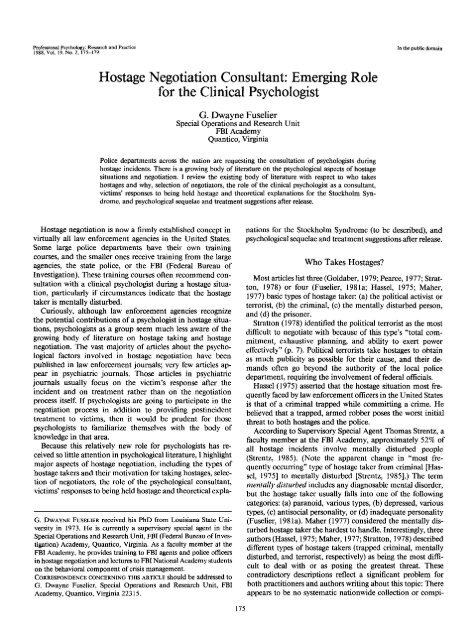
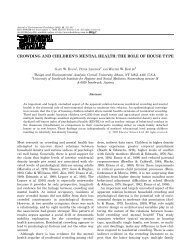
![5 Verben 2 S[1]. 35-44.pdf](https://img.yumpu.com/27096544/1/184x260/5-verben-2-s1-35-44pdf.jpg?quality=85)

